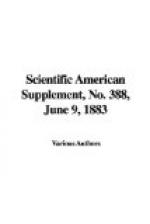We find, then, as a matter both of experience and of philosophy, that life or death, in the main and in the long run, turns on the single pivot of atmospheric movement or obstruction. The resistance of mere rising ground or dense vegetation to a free movement of the air from low-lying levels performs an obstructive office similar to that of the walls and roofs of houses, and with like effect. The invariable condition of unhealthy seasons and days is a state of rarefaction and stagnation of the atmosphere, when the poison-freighted vapor cannot be lifted and dispersed, and every one complains of the sultry, close, “muggy” (meaning murky) feeling of the air. Few reflect, when fretted by the boisterous winds of March, upon the vital office they perform in dispersing and sanitating the bacteria-laden exhalations let loose by the first warmth from the soaked soil and the macerated deposits of the former year.
The passing air, then, that we breathe so lightly, is on other business, and carries a load we little think of, and that is not to be trifled with. This grand carrier of nature, on business of life or death, must not be detained, must not be hindered! or they who interfere with the business by restraining walls and roofs will take the consequences. It is a good deal like stopping a bullet, except as to consciousness and suddenness of effect.
That men live at all in their obstructed and therefore poison-loaded atmosphere, is a proof of the wonderful efficiency of the protective economy of Nature within us; so wonderful, indeed, that few can believe the fact of living to be consistent with the real existence of such a deadly environment as science pretends to reveal. It is a common impression, therefore, that actual results fail to justify the alarm sounded by sanitarians. Hence the necessity for calling attention at the outset to an ample and manifest equivalent for the deadly dose of confined exhalations taken daily by all civilized men. We perceive that that dose is not lost, like the Humboldt River, in a “sink,” but reappears, like the wide-sown grass, in a perennial and universal crop of diseases, almost numberless and ever increasing in number, peculiar to house-dwellers. The trail of these plagues stops nowhere else; it leads straight to the imprisoned atmosphere in our artificial inclosures, and there it ends. That marvelous protective economy of Nature within us, to which we have referred, is no perpetual guaranty against the consequences of our negligence; it is only a limited reprieve, to afford space for repentance; and unless we hasten to improve the day of grace, the suspended sentence comes down, upon us at last with force the more accumulated by delay.




